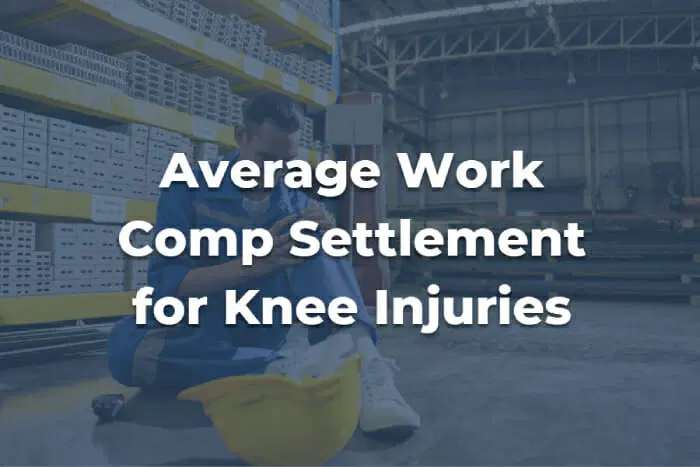
Average Workers’ Comp Settlement for Knee Injury or Replacement in California
Legally reviewed by: Jessica Anvar Stotz, JD, MBA
Short Answer: According to the National Safety Council, In California and the rest of the United States, the average workers’ compensation settlement for a knee injury is $34,932.
While this number is very specific, it’s important to note that each case is different and many cases settle for higher than what you see here. If you’d like to know what your knee injury case is worth, contact us today to get in touch with a lawyer who can provide you a quote.
Calculate What Your Settlement Might Be
Fill out the questions below to get an estimate of what your potential settlement could be. Don’t let your medical bills and expenses pile up!
Example Workers’ Compensation Knee Injury & Replacement Cases
Example Case #1
John is a construction worker who was employed by XYZ Construction Company. While working on a construction site, he tripped over some debris and injured his knee. John reported the incident immediately and sought medical attention. After evaluation, it was determined that he had suffered a torn meniscus and required surgery.
John filed a workers’ compensation claim, and it was established that the knee injury occurred within the scope of his employment. The claim covered medical expenses, including surgery, physical therapy, and ongoing treatment. John’s treating physician estimated a significant recovery period, and it was determined that he would have restrictions on his ability to work during this time.
The workers’ compensation insurance company initially provided temporary disability benefits to cover a portion of John’s lost wages while he was unable to work. However, due to the severity of the injury and the potential long-term impact on John’s ability to perform his job, negotiations for a settlement began.
After considering the medical reports, John’s anticipated future medical needs, and his potential loss of future earning capacity, the parties involved reached a settlement agreement. The settlement provided John with a lump sum payment to cover his medical expenses, ongoing treatment, lost wages, and compensation for the permanent impairment caused by the knee injury.
Example Case #2
Sarah works as a delivery driver for a logistics company. One day, while loading heavy packages into her truck, she slipped on a wet surface and fell, injuring her knee. She experienced intense pain and sought immediate medical attention. After a series of examinations and consultations, it was determined that she had sustained severe damage to her knee joint and required a total knee replacement surgery.
Sarah filed a workers’ compensation claim, and it was established that the knee injury was directly related to her job duties. The claim covered the cost of her medical treatments, including surgery, hospitalization, physical therapy, and pain medications.
Due to the complexity of her injury and the extensive recovery time required after a knee replacement surgery, Sarah’s ability to perform her job was significantly impacted. Her treating physician provided a detailed medical report outlining the permanent restrictions on her ability to work, as well as the anticipated need for ongoing medical care and physical therapy.
Given the severity of Sarah’s injury and the long-term implications on her ability to work and earn a living, negotiations for a workers’ compensation settlement began. The settlement discussions took into account her medical expenses, lost wages during her recovery period, compensation for the permanent impairment caused by the knee replacement, and potential loss of future earning capacity.
After careful consideration of all relevant factors, including medical records, expert opinions, and the potential costs of ongoing treatment, a settlement agreement was reached. The settlement provided Sarah with a lump sum payment to cover her past and future medical expenses, lost wages, and compensation for the permanent disability resulting from the knee replacement surgery.
Example Case #3
Mark works as a mail carrier for a postal service company. While delivering mail on his route, he encountered a customer’s unleashed dog that aggressively lunged at him and bit his knee. Mark suffered significant pain and immediately sought medical attention. The bite caused deep puncture wounds, torn tissue, and nerve damage in his knee.
Mark reported the incident to his employer and filed a workers’ compensation claim, as the dog bite occurred while he was performing his job duties. The claim covered the cost of his medical treatment, including emergency care, wound cleaning, stitches, and ongoing rehabilitation for his knee injury.
The workers’ compensation insurance company assigned an adjuster to investigate the claim and determine liability. It was established that the dog owner was responsible for the injuries Mark sustained due to their negligence in failing to control the dog. As a result, the workers’ compensation claim proceeded, and Mark continued to receive necessary medical treatment for his knee.
In this case, the workers’ compensation process involved addressing both the physical injury and any potential psychological trauma resulting from the dog bite incident. Mark’s treatment plan included not only physical therapy but also counseling sessions to address any psychological distress caused by the attack.
As the recovery progressed, Mark’s medical condition stabilized, and it was determined that he had reached maximum medical improvement (MMI), meaning his condition was unlikely to significantly improve with further medical intervention. At this stage, discussions for a settlement began to address the long-term impact on Mark’s knee and his ability to perform his job as a mail carrier.
The settlement negotiations considered factors such as the severity of the knee injury, the anticipated need for ongoing medical care or future surgeries, any potential limitations on Mark’s ability to perform his job duties, and the psychological impact of the incident.
The settlement agreement reached between Mark, his legal representation, and the workers’ compensation insurance company provided him with compensation for his medical expenses, lost wages during his recovery, and additional damages for pain and suffering caused by the dog bite.

What Factors Affect Settlement Amount?
Factors that can affect the settlement amount of a workers’ compensation case:
- Severity of the injury
- Extent of medical treatment required
- Duration of disability
- Impact on the worker’s ability to perform their job
- Jurisdiction’s workers’ compensation laws
- Worker’s average weekly wage
- Cost of past and future medical expenses
- Lost wages
- Vocational rehabilitation needs
- Degree of permanent impairment or disability
- Potential loss of future earning capacity
- Effectiveness of legal representation
- Negotiation skills
- Evidence presented in the case
This list of factors is not exhaustive in what collectively contribute to the determination of the settlement amount in a workers’ compensation case.
Should You Settle or Negotiate Your Claim?
When deciding whether to accept the initial workers’ compensation settlement offer or negotiate further, it’s important to assess your specific circumstances. Consider factors such as the extent of your injuries, future medical needs, lost wages, and potential long-term impact on your ability to work.
Negotiating the settlement allows you the opportunity to potentially increase the offered amount to better meet your requirements. Seeking guidance from a workers’ compensation lawyer can provide valuable advice and ensure your rights are protected throughout the process.
The negotiation timeline can vary, taking anywhere from a few weeks to several months. Take the time to carefully evaluate your situation before making a decision.
What Will a Settlement Check Cover?
A workers’ compensation settlement check in California typically covers various aspects related to the work-related injury. Here are some common components that may be included:
- Medical Expenses: The settlement check may cover medical costs related to the injury, including doctor visits, hospitalization, surgeries, medications, physical therapy, and rehabilitation.
- Temporary Disability Benefits: If you were unable to work due to the injury, the settlement may include compensation for the lost wages during the period of temporary disability.
- Permanent Disability: If the injury resulted in a permanent impairment or disability, the settlement may provide compensation for the long-term impact on your ability to work or perform certain tasks.
- Vocational Rehabilitation: If you require vocational retraining or assistance to return to work in a different capacity due to your injury, the settlement may cover the costs associated with vocational rehabilitation services.
- Future Medical Expenses: In some cases, the settlement may include funds to cover anticipated future medical treatments, such as follow-up surgeries, ongoing therapies, or necessary medical equipment.
- Lump Sum or Structured Payments: The settlement check can be provided as a lump sum payment or structured payments over a designated period, depending on the terms negotiated.
Keep in mind that each workers’ compensation settlement is unique and may vary based on the specific circumstances of the case, the severity of the injury, and other relevant factors.
What Evidence is Needed for Your Case?
While specific requirements may vary depending on the circumstances, here are some common types of evidence that can be helpful:
- Incident Documentation: Gather any incident reports, accident records, or witness statements that detail how the injury occurred. This helps establish a clear connection between the workplace and the injury.
- Medical Records: Medical documentation plays a crucial role in proving the extent of your injuries and the need for medical treatment. This includes doctor’s reports, diagnostic tests, treatment plans, prescriptions, and records of any surgeries or therapies undergone.
- Work History: Provide evidence of your employment history, including job descriptions, timecards, pay stubs, or any other relevant employment records. This establishes that you were employed and engaged in work-related activities at the time of the injury.
- Witness Statements: Statements from coworkers, supervisors, or others who witnessed the accident or can testify to the conditions that contributed to the injury can strengthen your case.
- Expert Opinions: In some cases, expert opinions from medical professionals or vocational experts may be necessary to provide insights into the severity of your injuries, the need for specific treatments, or the impact of the injury on your ability to work.
- Documentation of Expenses: Keep track of all related expenses, such as medical bills, prescriptions, travel costs for medical appointments, and any other out-of-pocket expenses incurred due to the injury.
Should You Speak with Insurance Companies?
After filing a workers’ compensation claim, it’s wise to be cautious of insurance companies for several reasons. They prioritize profits over fair compensation, often leading to claim denials or disputes.
Even accepted claims may face delayed or reduced benefits. Insurance companies may limit communication and take advantage of complex procedures, leaving injured workers at a disadvantage. Their primary goal is to minimize costs, which can conflict with providing adequate compensation.
Seeking legal representation can help protect rights, navigate the process, and ensure fair treatment. Stay vigilant and consult an attorney to safeguard your interests in dealing with insurance companies.

Get in Touch with a Lawyer
If you have questions about your knee injury, we have answers. Contact us today to get connected with one of the best workers’ compensation attorneys in your area. They’ll provide you with a free consultation of your case and a potential settlement quote.


